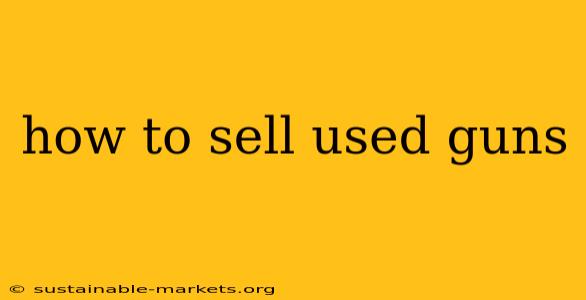Selling a used firearm can seem daunting, but with careful planning and adherence to the law, it can be a straightforward process. This guide outlines the crucial steps to ensure a safe and legal sale, protecting both you and the buyer. Remember, regulations vary by state and locality, so always verify your local laws before proceeding.
Understanding the Legal Landscape
Before you even think about listing your firearm, understand the legal requirements in your area. This isn't just about federal laws; state and local ordinances significantly impact the sale of used firearms. Key considerations include:
- Background checks: Federal law requires licensed dealers to conduct background checks on all firearm purchasers. Depending on your location and the type of transfer, you may be required to conduct a background check yourself or utilize a licensed dealer for the transaction.
- Waiting periods: Some states mandate waiting periods between the sale and the transfer of a firearm.
- Prohibited persons: There are categories of individuals legally prohibited from owning firearms. Knowing these restrictions is vital to avoid legal issues. This includes felons, individuals with specific mental health conditions, and those subject to domestic violence restraining orders.
- Registration: Certain states require firearm registration. Familiarize yourself with your state's registration requirements before selling.
Ignoring these legal requirements can lead to serious penalties, including hefty fines and imprisonment. Consult your state's attorney general's website or a legal professional for specific guidance.
Preparing Your Firearm for Sale
Once you've confirmed the legality of the sale, prepare your firearm for a smooth transaction:
- Clean and inspect: A clean and well-maintained firearm is more appealing to potential buyers. Thoroughly clean the weapon and inspect it for any damage or defects. Honestly disclose any imperfections to potential buyers.
- Gather documentation: Collect all relevant documentation, including the original paperwork, if available. This adds legitimacy and transparency to the sale.
- Assess value: Research the current market value of your firearm based on its make, model, condition, and accessories. Websites specializing in firearm sales, as well as local gun shops, can provide valuable insights. Don't undervalue your firearm, but be realistic about its worth.
Choosing a Safe and Legal Sales Method
Several options exist for selling a used firearm; each has its own set of pros and cons.
Private Sale:
- Pros: Potentially higher profit margins.
- Cons: Increased responsibility for legal compliance, higher risk of unsafe transactions. Requires more effort in finding a buyer and ensuring a safe transfer.
Using a Licensed Firearms Dealer:
- Pros: Simplified legal compliance, reduced risk, enhanced safety during the transaction.
- Cons: Lower profit margins due to the dealer's commission.
Online Marketplaces:
- Pros: Wider reach for potential buyers.
- Cons: Requires careful vetting of buyers to avoid scams and ensure legal compliance. Be cautious of fraudulent activity.
Regardless of the method chosen, always prioritize safety and legal compliance.
Conducting a Safe Transaction
- Meet in a public place: Never meet a buyer in a secluded location. Choose a well-lit, public place, ideally with security cameras.
- Bring a witness: Having a third party present during the transaction adds an extra layer of security and accountability.
- Verify the buyer's identity: Check identification documents to ensure the buyer is legally permitted to own a firearm.
- Complete the paperwork accurately: Ensure all necessary paperwork is filled out correctly and signed by both parties.
- Retain records: Keep copies of all paperwork, including receipts and identification copies, for your records.
Conclusion
Selling a used firearm requires careful attention to legal and safety procedures. By understanding your local regulations, preparing your firearm thoroughly, and choosing a secure sales method, you can ensure a smooth, legal, and safe transaction for both yourself and the buyer. Remember, responsible gun ownership extends beyond just owning the weapon; it includes understanding and adhering to the laws surrounding its sale and transfer.

